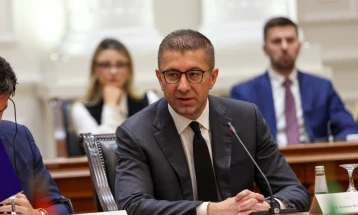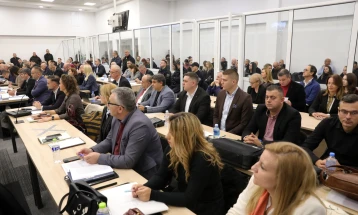Nov Istevnik flames put out, but despair and desperation linger

Skopje, 18 August 2021 (MIA) - Wildfires have been put out, but the residents of Nov Istevnik, a village in eastern North Macedonia, are in despair. They say there have been other fires, but this one is going to be remembered for a long time. They admitted to MIA how difficult it is to believe in the power of fire, which is able to take away in minutes what was built over the span of many years.
“It was a very scary situation. Everything was on fire, I almost burned alive. Everything burned on one of the fields, plums, trees and whatnot, put it out on one end, put it out on another and no one had time to look at the church. The church and graveyard burned down, I wish I wasn’t alive to witness this right now,” says Gjorgjija Stanoev.
Because of burned down electrical utility poles and the lack of power, he threw out all of his food because he had nowhere to keep it.
Slave Nikovski is another resident who was spared by the flames, with the exception of burned livestock. He’s searching for the livestock that ran away during the fires, as well.
“Everything was getting destroyed, we sprayed with pumps, we took out water from the well and tried to put it out. This is terrifying, God forbid it happens again to anyone,” he says.
Slobodan Nikolovski adds that the fire started suddenly.
“People started yelling ‘run, there’s a fire’, and all of a sudden there was a burning barrel next to us. By the time we ran from one side to the other, the fire had spread. Luckily, no one got hurt, but we felt so powerless,” Nikolovski says.
 MIA spoke to another resident who faced the flames. He considers it lucky that there were no human casualties.
“We were so scared. We’ll never forget this. As soon as the fire started, there was a mother with her child in the woods, and the child immediately started crying when they saw the fire,” he said.
Public awareness an important precondition for reducing forest fires
The Crisis Management Center (CMC) says that the main culprits for fires are people, both accidentally and purposefully, then glass and other waste thrown in dry vegetation, as well as wire sparks from transmission lines.
The increase in public awareness about the significance of the woods and their economic, social and ecological role in people’s everyday lives require more forest management responsibility as a natural resource, with a special accent on their protection and control of firewood, technical wood for the wood industry, construction, as well as other forest products that present an important source of income for the rural population.
MIA spoke to another resident who faced the flames. He considers it lucky that there were no human casualties.
“We were so scared. We’ll never forget this. As soon as the fire started, there was a mother with her child in the woods, and the child immediately started crying when they saw the fire,” he said.
Public awareness an important precondition for reducing forest fires
The Crisis Management Center (CMC) says that the main culprits for fires are people, both accidentally and purposefully, then glass and other waste thrown in dry vegetation, as well as wire sparks from transmission lines.
The increase in public awareness about the significance of the woods and their economic, social and ecological role in people’s everyday lives require more forest management responsibility as a natural resource, with a special accent on their protection and control of firewood, technical wood for the wood industry, construction, as well as other forest products that present an important source of income for the rural population.
 The President of the Private Forest Owners Association, Vojo Sokolovski, concurs saying enthusiasm is not enough, and self-organization is the solution.
“We have to be self-organized. We’re used to waiting for someone to organize us, but I think it’s about time for us to start thinking for ourselves and organizing ourselves locally. Institutional participation, as well as participation by the citizens, has been huge, I have to admit with great pleasure. The people helped so much with the fires that had been raging for the past 10 days or so, but the fact is that we lack techniques and knowledge. We can’t solve it with enthusiasm alone. We have to sit down and build a new system alongside the institutions,” Sokolovski says.
Wildfires helped us see shortcomings in preparation to deal with them
Despite the institutions’ quick reactions and successful putting out of the fires, the issues this country is facing when it comes to the preparedness for dealing with larger fires have surfaced regardless.
Sokolovski believes we fail on multiple levels, and the solution is an in-depth, all-encompassing analysis.
“Everything may be wonderful on paper, but it’s difficult to apply. I think we should finally start using the experiences by some western countries, whose levels of protection are much higher when it comes to forestry. I’d like to mention Slovenia as an example. We saw some of the equipment that was brought over, so we can imagine the equipment and resources they have over there. I have to point out that it’s another thing altogether to not be a member of the EU and to be excluded from the part of purchasing materials,” he states.
The President of the Private Forest Owners Association, Vojo Sokolovski, concurs saying enthusiasm is not enough, and self-organization is the solution.
“We have to be self-organized. We’re used to waiting for someone to organize us, but I think it’s about time for us to start thinking for ourselves and organizing ourselves locally. Institutional participation, as well as participation by the citizens, has been huge, I have to admit with great pleasure. The people helped so much with the fires that had been raging for the past 10 days or so, but the fact is that we lack techniques and knowledge. We can’t solve it with enthusiasm alone. We have to sit down and build a new system alongside the institutions,” Sokolovski says.
Wildfires helped us see shortcomings in preparation to deal with them
Despite the institutions’ quick reactions and successful putting out of the fires, the issues this country is facing when it comes to the preparedness for dealing with larger fires have surfaced regardless.
Sokolovski believes we fail on multiple levels, and the solution is an in-depth, all-encompassing analysis.
“Everything may be wonderful on paper, but it’s difficult to apply. I think we should finally start using the experiences by some western countries, whose levels of protection are much higher when it comes to forestry. I’d like to mention Slovenia as an example. We saw some of the equipment that was brought over, so we can imagine the equipment and resources they have over there. I have to point out that it’s another thing altogether to not be a member of the EU and to be excluded from the part of purchasing materials,” he states.
 The problem isn’t lack of ideas, he says, but lack of action.
“I refer to prevention from fires, because if we, the locals, don’t do something in real time, then the Slovenians can’t offer us much and we can’t expect them to solve our problems. They’ll come, do the job, like they already did, and we were overjoyed, but they had to leave. Our problems have remained, and it’s up to us to overcome them,” Sokolovski says.
Human beings and forests have always depended on each other for survival. In other words, the forests have always followed the development of mankind, having been part of our surroundings. The power of the forest is in the air that gives us. Without air, we’ll be gone too. The question remains, will humanity continue to destroy itself, or will we band together to help the planet recover?
https://youtu.be/aI-jEDDlcMo
Simona Srbinoska
Photos by MIA
Editing by Aslan Vishko
Translated by Dragana Knezhevikj
The problem isn’t lack of ideas, he says, but lack of action.
“I refer to prevention from fires, because if we, the locals, don’t do something in real time, then the Slovenians can’t offer us much and we can’t expect them to solve our problems. They’ll come, do the job, like they already did, and we were overjoyed, but they had to leave. Our problems have remained, and it’s up to us to overcome them,” Sokolovski says.
Human beings and forests have always depended on each other for survival. In other words, the forests have always followed the development of mankind, having been part of our surroundings. The power of the forest is in the air that gives us. Without air, we’ll be gone too. The question remains, will humanity continue to destroy itself, or will we band together to help the planet recover?
https://youtu.be/aI-jEDDlcMo
Simona Srbinoska
Photos by MIA
Editing by Aslan Vishko
Translated by Dragana Knezhevikj
 MIA spoke to another resident who faced the flames. He considers it lucky that there were no human casualties.
“We were so scared. We’ll never forget this. As soon as the fire started, there was a mother with her child in the woods, and the child immediately started crying when they saw the fire,” he said.
Public awareness an important precondition for reducing forest fires
The Crisis Management Center (CMC) says that the main culprits for fires are people, both accidentally and purposefully, then glass and other waste thrown in dry vegetation, as well as wire sparks from transmission lines.
The increase in public awareness about the significance of the woods and their economic, social and ecological role in people’s everyday lives require more forest management responsibility as a natural resource, with a special accent on their protection and control of firewood, technical wood for the wood industry, construction, as well as other forest products that present an important source of income for the rural population.
MIA spoke to another resident who faced the flames. He considers it lucky that there were no human casualties.
“We were so scared. We’ll never forget this. As soon as the fire started, there was a mother with her child in the woods, and the child immediately started crying when they saw the fire,” he said.
Public awareness an important precondition for reducing forest fires
The Crisis Management Center (CMC) says that the main culprits for fires are people, both accidentally and purposefully, then glass and other waste thrown in dry vegetation, as well as wire sparks from transmission lines.
The increase in public awareness about the significance of the woods and their economic, social and ecological role in people’s everyday lives require more forest management responsibility as a natural resource, with a special accent on their protection and control of firewood, technical wood for the wood industry, construction, as well as other forest products that present an important source of income for the rural population.
 The President of the Private Forest Owners Association, Vojo Sokolovski, concurs saying enthusiasm is not enough, and self-organization is the solution.
“We have to be self-organized. We’re used to waiting for someone to organize us, but I think it’s about time for us to start thinking for ourselves and organizing ourselves locally. Institutional participation, as well as participation by the citizens, has been huge, I have to admit with great pleasure. The people helped so much with the fires that had been raging for the past 10 days or so, but the fact is that we lack techniques and knowledge. We can’t solve it with enthusiasm alone. We have to sit down and build a new system alongside the institutions,” Sokolovski says.
Wildfires helped us see shortcomings in preparation to deal with them
Despite the institutions’ quick reactions and successful putting out of the fires, the issues this country is facing when it comes to the preparedness for dealing with larger fires have surfaced regardless.
Sokolovski believes we fail on multiple levels, and the solution is an in-depth, all-encompassing analysis.
“Everything may be wonderful on paper, but it’s difficult to apply. I think we should finally start using the experiences by some western countries, whose levels of protection are much higher when it comes to forestry. I’d like to mention Slovenia as an example. We saw some of the equipment that was brought over, so we can imagine the equipment and resources they have over there. I have to point out that it’s another thing altogether to not be a member of the EU and to be excluded from the part of purchasing materials,” he states.
The President of the Private Forest Owners Association, Vojo Sokolovski, concurs saying enthusiasm is not enough, and self-organization is the solution.
“We have to be self-organized. We’re used to waiting for someone to organize us, but I think it’s about time for us to start thinking for ourselves and organizing ourselves locally. Institutional participation, as well as participation by the citizens, has been huge, I have to admit with great pleasure. The people helped so much with the fires that had been raging for the past 10 days or so, but the fact is that we lack techniques and knowledge. We can’t solve it with enthusiasm alone. We have to sit down and build a new system alongside the institutions,” Sokolovski says.
Wildfires helped us see shortcomings in preparation to deal with them
Despite the institutions’ quick reactions and successful putting out of the fires, the issues this country is facing when it comes to the preparedness for dealing with larger fires have surfaced regardless.
Sokolovski believes we fail on multiple levels, and the solution is an in-depth, all-encompassing analysis.
“Everything may be wonderful on paper, but it’s difficult to apply. I think we should finally start using the experiences by some western countries, whose levels of protection are much higher when it comes to forestry. I’d like to mention Slovenia as an example. We saw some of the equipment that was brought over, so we can imagine the equipment and resources they have over there. I have to point out that it’s another thing altogether to not be a member of the EU and to be excluded from the part of purchasing materials,” he states.
 The problem isn’t lack of ideas, he says, but lack of action.
“I refer to prevention from fires, because if we, the locals, don’t do something in real time, then the Slovenians can’t offer us much and we can’t expect them to solve our problems. They’ll come, do the job, like they already did, and we were overjoyed, but they had to leave. Our problems have remained, and it’s up to us to overcome them,” Sokolovski says.
Human beings and forests have always depended on each other for survival. In other words, the forests have always followed the development of mankind, having been part of our surroundings. The power of the forest is in the air that gives us. Without air, we’ll be gone too. The question remains, will humanity continue to destroy itself, or will we band together to help the planet recover?
https://youtu.be/aI-jEDDlcMo
Simona Srbinoska
Photos by MIA
Editing by Aslan Vishko
Translated by Dragana Knezhevikj
The problem isn’t lack of ideas, he says, but lack of action.
“I refer to prevention from fires, because if we, the locals, don’t do something in real time, then the Slovenians can’t offer us much and we can’t expect them to solve our problems. They’ll come, do the job, like they already did, and we were overjoyed, but they had to leave. Our problems have remained, and it’s up to us to overcome them,” Sokolovski says.
Human beings and forests have always depended on each other for survival. In other words, the forests have always followed the development of mankind, having been part of our surroundings. The power of the forest is in the air that gives us. Without air, we’ll be gone too. The question remains, will humanity continue to destroy itself, or will we band together to help the planet recover?
https://youtu.be/aI-jEDDlcMo
Simona Srbinoska
Photos by MIA
Editing by Aslan Vishko
Translated by Dragana Knezhevikj 






